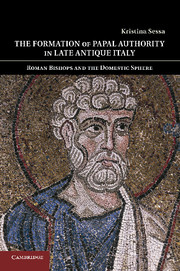Book contents
- Frontmatter
- Contents
- Acknowledgments
- Abbreviations
- Map Late Roman Italy
- Roman Bishops from Peter to Gregory I
- Introduction: Household Management and the Bishop of Rome
- Chapter 1 The Late Roman Household in Italy
- Chapter 2 From Dominion to Dispensatio: Stewardship as an Elite Ideal
- Chapter 3 Primus Cultor: Episcopal Householding in Theory and Practice
- Chapter 4 Overseeing the Overseer: Bishops and Lay Households
- Chapter 5 Cultivating the Clerical Household: Marriage, Property, and Inheritance
- Chapter 6 Mistrusting The Bishop: Succession, Stewardship, and Sex in the Laurentian Schism
- Chapter 7 The Household and The Bishop: Authority, Cooperation, and Competition in the Gesta Martyrum
- Conclusion
- Bibliography
- Index
Chapter 7 - The Household and The Bishop: Authority, Cooperation, and Competition in the Gesta Martyrum
Published online by Cambridge University Press: 05 December 2011
- Frontmatter
- Contents
- Acknowledgments
- Abbreviations
- Map Late Roman Italy
- Roman Bishops from Peter to Gregory I
- Introduction: Household Management and the Bishop of Rome
- Chapter 1 The Late Roman Household in Italy
- Chapter 2 From Dominion to Dispensatio: Stewardship as an Elite Ideal
- Chapter 3 Primus Cultor: Episcopal Householding in Theory and Practice
- Chapter 4 Overseeing the Overseer: Bishops and Lay Households
- Chapter 5 Cultivating the Clerical Household: Marriage, Property, and Inheritance
- Chapter 6 Mistrusting The Bishop: Succession, Stewardship, and Sex in the Laurentian Schism
- Chapter 7 The Household and The Bishop: Authority, Cooperation, and Competition in the Gesta Martyrum
- Conclusion
- Bibliography
- Index
Summary
Not everyone trusted the bishop in household matters. Resistance to his claims of domestic expertise took various forms, from foot-dragging and public censure to organized schism. A more positive and cooperative perspective on the relationship between the household and the bishop was also possible, however. In the gesta martyrum, a body of popular martyr narratives independently written between ca. 450 and 600, householders and bishops join forces to preserve the integrity of the domus and the spiritual imperatives of its lordly overseer. Here Rome's early bishops play integral roles in the transformation of an elite “pagan” household into a pious and productive Christian domus, in which the householder's authority is oriented around the ethics of stewardship and robust religious oversight. Roman bishops of the gesta martyrum inhabit a distinct and durable place within the households of other men; their presence both strengthens the paterfamilias’ power and reveals its dependence on the bishop's assistance. Yet the gesta martyrum also draw the clearest line yet between the bishop's authority in the church and his reach into the domestic sphere.
Following a discussion of the texts’ dating, authorship, and audiences, this chapter examines the cultural and religious meaning of a recurring “tale type” in the gesta: the conversion of a prosperous aristocratic pagan household through the spiritual and ritual interventions of a Christian holy man, who is often (but not always) a bishop. The first part of the analysis establishes how the domestic conversion episode turns on a dynamic of social and ritual exchange, wherein bishops and householders cooperate not only to convert a pagan household but also to define the householder's social identity as “elite.” Close attention is paid to the bishop's role in the process as a healer and ritual celebrant and to how his exercise of charismatic power establishes his authority within certain spaces of the domestic sphere. This section focuses on six versions of the domestic conversion episode that foreground episcopal characters: the passions of Clement (c. 95), Alexander (c. 110), Callistus (217–222), Cornelius (251–253), Stephen (254–257), and Marcellus (305/6–306/7). The second section examines how episcopal authority is circumscribed within the imagined households of the gesta. This section also analyzes variants of the domestic conversion episode that depict nonepiscopal holy men and that underline spaces within the household that were off limits to the bishop. The demarcation of the household and the emphasis on spiritual competitors in these other narratives present a counterpoint to the strongly episcopal vision of the household conveyed elsewhere in the gesta.
- Type
- Chapter
- Information
- The Formation of Papal Authority in Late Antique ItalyRoman Bishops and the Domestic Sphere, pp. 247 - 273Publisher: Cambridge University PressPrint publication year: 2011



